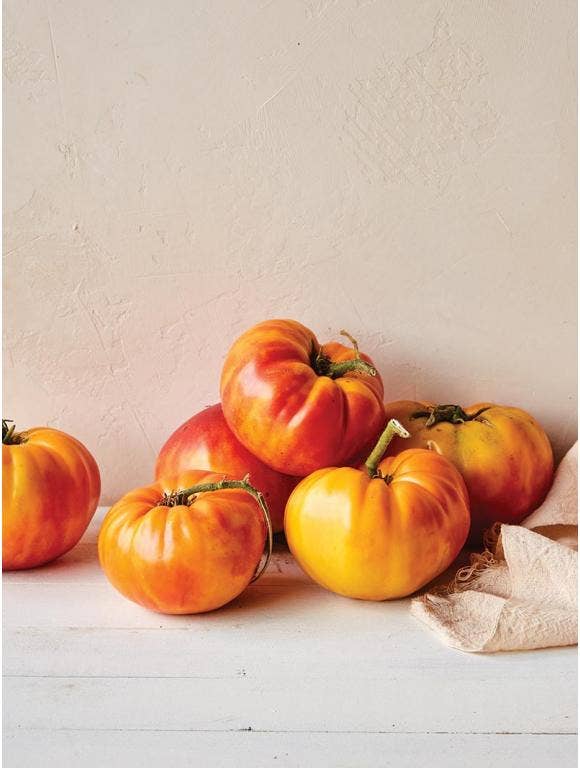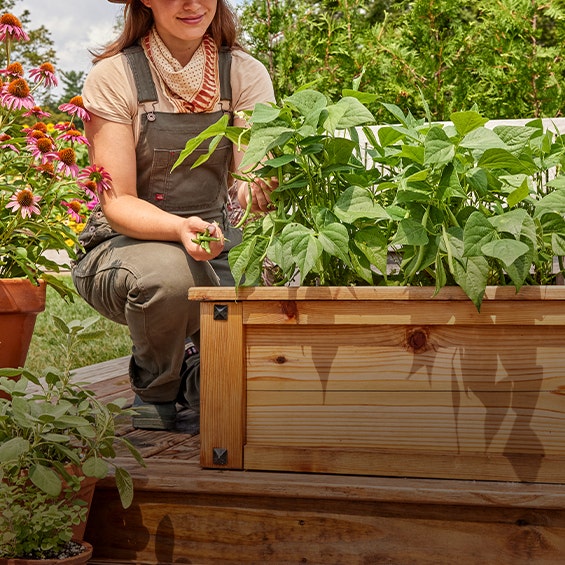


In the past decade, heirloom fruits and vegetables have blossomed in their popularity. Available in grocery stores and specifically called out in restaurants, these classics get the red carpet treatment — and for good reason! But what is an heirloom, and what makes them special?
What Is An Heirloom?
While the term "heirloom" is often associated with tomatoes, the word may also be applied to any open-pollinated fruits, vegetables and flowers that were introduced at least 50 years ago. Open-pollination occurs when bees and other natural pollinators fertilize the plants.
Heirlooms come with long histories and have been grown for many years, passed down from generation to generation. Often viewed as traditional, heirloom cultivars come with wholesomely whimsical names such as 'Brandywine Pink' tomatoes, 'California Wonder' bell peppers and 'Burpee's Butterbush' squash. But heirlooms are more than colorful fruits and uniquely shaped veggies that sound as if they came straight from a Midwestern farmers market. They've been purposely grown, selected and passed the test of time to grace our gardens with their superb pedigrees.
Are Heirlooms Organic?
Although heirlooms can be grown organically, they aren't organic by definition. For a crop to be organic, it must be grown with minimal man-made pesticides and fertilizers. And while there are no genetically modified (GMO) crop plants currently available on the market for residential use, you can still rest assured that all heirlooms are 100% natural and derived through traditional breeding techniques.
Why Choose to Grow Heirlooms?
People might choose to grow heirlooms for many reasons. For one, heirloom fruits and vegetables are well known for their unique flavor profiles with that "homegrown" feel that's difficult to find in supermarkets. They've been grown to be flavorful and fill particular culinary niches wherever they're found. Regardless of their color, shape or size, their flavors have ensured their continued planting in home gardens year after year.
Another great quality of heirlooms is that, as open-pollinated plants, they come true to type from seed and can be harvested and reseeded in subsequent years. Over time and by continuously selecting seeds from only the best plants in the garden, they've gradually changed and evolved into distinct lineages. Each heirloom cultivar is a representation of the culture and people from which it was developed.
What's the Difference Between Heirlooms and Hybrids?
So if heirlooms have such amazing flavor, a diversity of colors and proven pedigrees that go back generations, how do you choose between an heirloom and a hybrid?
A great analogy to help express the differences between the two is to think of heirlooms like horses and hybrids like mules. Like horses, heirlooms come in a variety of shapes, sizes and colors. They get the job done and do it well. But like mules, hybrids are powerhouses full of vigor and stamina. Hybrids, too, come in a wide variety, but their ability to produce large amounts of uniform fruits coupled with disease resistance makes them stand out. Because of these traits, hybrids are what you'll find in the majority of supermarkets.
As a trade-off for the many wonderful attributes that heirlooms bring to the table, gardening with heirlooms requires some patience. Lacking the vigor of hybrids, they tend to grow slower, produce fewer flowers and, for fruits and vegetables, have lighter yields. Likewise, landscaping with heirloom flowering plants can mean fewer flowers throughout the growing season. However, open-pollinated plant heirlooms are fully fertile and provide copious amounts of nectar and pollen for pollinators. If you're looking to save seeds each fall, heirlooms are the best option.
In contrast, hybrids don't grow true from seed, and some newer hybrids like 'ProCut White Lite' sunflowers lack pollen altogether. Where reseeding is undesirable, pollen-free plants are far less likely to spread and might also be beneficial for those who struggle with seasonal allergies!
Heirloom plants are treasures to have in both vegetable gardens and landscaping. Their long histories and cultural value speak for themselves and should be a welcome addition to any home.


























